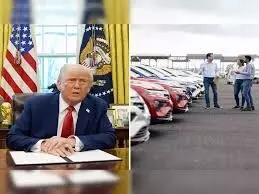Trump’s Tariff Gamble: The World on the Brink of a Trade War

With just hours left before President Donald Trump unveils his latest round of reciprocal tariffs, the global economic landscape stands at a precipice. The impending tariffs, targeting products from India and beyond, signal a deepening of protectionist policies that threaten to escalate into a full-fledged trade war. While Washington insists these measures are necessary to rectify trade imbalances, the reality is far more complex. At stake is not just economic policy but a geopolitical contest where economic nationalism, strategic alliances, and diplomatic brinkmanship collide. As nations brace for retaliatory actions, the fundamental question emerges: Is the world witnessing the dismantling of free trade, or is this a recalibration of economic power?
Trump’s tariff strategy is rooted in his long-standing belief that trade deficits weaken American industry. His administration has consistently argued that unfair trade practices—particularly from China, but also from allies like India—necessitate a more aggressive stance. The logic behind this move, according to White House officials, is that past administrations have allowed foreign competitors to gain an unfair advantage over American manufacturers, leading to job losses and a hollowed-out industrial base. This protectionist turn is not new; Trump’s trade policies since his first term have often reflected a departure from multilateralism, favoring unilateral measures that disrupt global supply chains.
However, while the administration frames tariffs as a tool for economic resurgence, the global response suggests otherwise. The European Union, China, and India have all signaled retaliatory measures, leading to fears of a tit-for-tat escalation. The specter of a global trade war is not merely rhetorical—it has tangible consequences. In India, sectors like pharmaceuticals, textiles, and information technology, which depend heavily on exports to the US, are poised to suffer significant losses. Moreover, Indian exporters now face the dual challenge of declining market access and increased costs due to retaliatory tariffs imposed by other nations. The timing is particularly troubling, as India's economy is already grappling with inflationary pressures and sluggish growth.
The geopolitical ramifications of Trump's tariff war extend beyond mere economic calculations. The United States has long relied on strategic partnerships with countries like India to counterbalance China’s growing influence. However, imposing punitive tariffs on Indian goods risks alienating a key regional ally at a time when Washington needs New Delhi’s support in its broader Indo-Pacific strategy. The Quad alliance—comprising the US, India, Japan, and Australia—was designed to counteract China’s economic and military expansionism. By targeting Indian exports, Trump risks undermining the very alliance that was intended to strengthen the US’s strategic positioning.
China, meanwhile, remains the central player in this evolving trade war. While the Trump administration has justified its tariffs as a means to curb China’s economic rise, Beijing has responded with calculated countermeasures, targeting US agricultural products, technology firms, and financial markets. Unlike India, which still seeks stronger trade ties with the US, China has actively worked to reduce its dependence on American imports by diversifying its trading partners. The recent push for the BRICS economic bloc, along with increased trade agreements with Russia, Brazil, and Africa, reflects Beijing’s strategy to insulate itself from American economic pressure. In this context, Trump’s tariffs may do little to curb China’s economic ambitions while simultaneously straining relations with India, a natural counterweight to Beijing.
Diplomatically, Trump's tariff war is testing the limits of global cooperation. The World Trade Organization (WTO), already weakened by US disengagement, finds itself increasingly sidelined as countries resort to unilateral trade measures. The rules-based global trading system, which has governed international commerce for decades, is now in question. If every nation follows the US’s example, the very principles of free trade that fueled global economic growth in the post-World War II era could be dismantled. Critics argue that Trump’s actions reflect a dangerous precedent—one where economic power supersedes diplomatic norms, and where might dictates market access.
For India, the stakes are exceptionally high. New Delhi has traditionally balanced its trade policies, maintaining strong ties with both the US and China while fostering regional economic partnerships. However, Trump’s tariffs force India into a difficult position—should it align more closely with Washington despite economic losses, or should it pivot towards alternative markets like the European Union and ASEAN nations? The answer is not straightforward. While India benefits from its strategic partnership with the US, it cannot afford to ignore the economic realities imposed by tariffs. This dilemma underscores a larger truth: economic nationalism, as championed by Trump, comes with geopolitical costs that extend beyond trade deficits and balance sheets.
Ultimately, the looming tariffs reflect a broader shift in the global order. As countries move towards more protectionist policies, the idea of globalization itself is being contested. Trump’s America First doctrine is not an isolated phenomenon; similar protectionist tendencies are visible in Europe, where economic nationalism is on the rise. The UK’s post-Brexit trade negotiations, Germany’s concerns over foreign market penetration, and France’s agricultural protectionism all highlight a world where self-interest increasingly dictates economic policy. The question is whether this shift marks a temporary phase or a permanent reordering of global trade.
As the countdown to Trump’s announcement nears its end, the world watches with bated breath. Will the tariffs serve as a negotiating tool to extract better trade deals, or will they unleash a spiral of economic retaliation that disrupts global commerce? What is clear is that the ripple effects of these decisions will be felt far beyond Washington and New Delhi. In an interconnected world, trade wars are never isolated conflicts—they redefine alliances, recalibrate economies, and ultimately reshape the global order.
